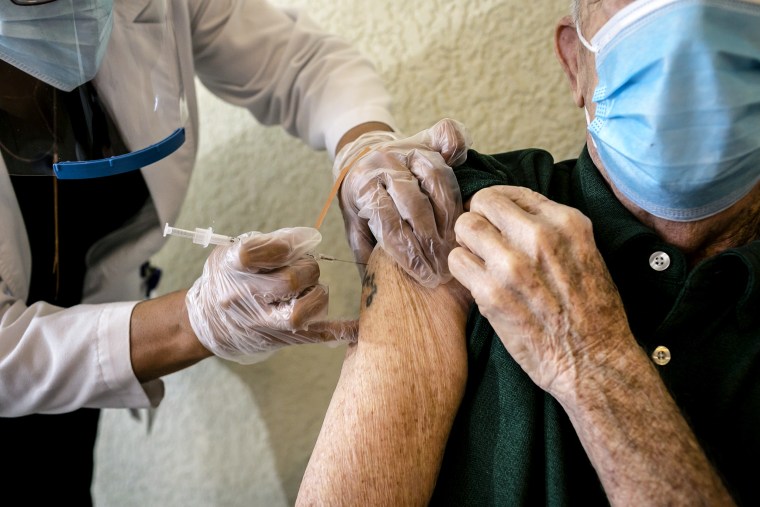Despite the power of Covid-19 vaccines in cutting the risk of hospitalization and death from the disease, fully vaccinated people can get very sick and die from the virus in rare cases. Those individuals tend to be older than 65 or have weakened immune systems or other severe medical conditions, an NBC News survey of health officials nationwide found.
"Throughout the pandemic, people who died of Covid-19 were most likely to be older, and that continues to be true with breakthrough cases," a spokesperson for the Massachusetts Department of Public Health said in an email.
Full coverage of the Covid-19 pandemic
In Oregon, about 10 percent of the breakthrough infections reported to the state were in people living in nursing homes or congregate care facilities, and the majority of deaths were older people.
According to the Minnesota Department of Health, the median age of breakthrough cases that have resulted in hospitalization is 74.
This is the same population that has been more vulnerable to the most dire consequences of Covid-19 since the beginning of the pandemic.
It's a trend that's been seen outside of the United States as well.
Dr. Tal Brosh, who heads the infectious disease unit at Assuta Ashdod University Hospital in Israel, has noted that breakthrough infections tend to be more serious among those with underlying conditions, such as high blood pressure, diabetes and kidney disease.
"If you're vaccinated and you have a lot of co-morbidities or you are immunocompromised, you are not that well protected as someone else who is vaccinated," Brosh said.
Immunocompromised patients can include people who were already taking medications to suppress their immune system following an organ transplant or cancer diagnosis.
Such breakthrough infections do not mean the vaccines are not working. No vaccine is 100 percent effective against infection.
Though the Centers for Disease Control and Prevention initially tracked all breakthrough infections, as of May 1 the agency shifted to only tracking those linked to hospitalization or death. At that point, its tally had topped 10,000.
But NBC News found that many states continued to track all breakthrough infections, with 27 states reporting they have logged, in total, more than 65,000 cases.
That still represents just a tiny fraction of the more than 160 million fully vaccinated people in the U.S. And the vast majority of these breakthrough cases "tend to be milder," Dr. Jay Butler, head of the Covid-19 response at the CDC, said during a briefing with the Infectious Diseases Society of America last week. "Even if infection occurs, it reduces the risk of hospitalization."
Still, it is possible for breakthrough infections to lead to severe illness, hospitalization and even death, particularly in more vulnerable individuals.
As of July 12, the CDC has reported nearly 5,500 cases in which a fully vaccinated person with Covid-19 was hospitalized or died. Seventy-five percent of those patients were over age 65.
But a breakthrough case didn't necessarily cause the hospitalization or death. Many breakthrough infections are asymptomatic and are found by chance or routine testing among patients who arrive at the hospital for other reasons, such as heart conditions or other medical problems.
In fact, in 1,456, or 28 percent, of the hospitalizations tracked by the CDC, the breakthrough cases were either asymptomatic or didn't play a role in why the patient was hospitalized. Take, for example, an older man who goes to the hospital for a heart attack. He tests positive for Covid-19 but without any symptoms. He still must be hospitalized to receive treatment for the heart attack.
That can also be true for the deaths that have occurred in people with breakthrough infections.
In Delaware, a spokesperson for the state's Division of Public Health said just because residents had died with a diagnosis of Covid-19 "does not mean Covid was the cause of death."
Similar observations have been made in Colorado.
"Someone may have died or been hospitalized as a result of another cause, but tested positive for Covid-19," the Colorado Department of Public Health and Environment said in an email.
Download the NBC News app for full coverage of the Covid-19 pandemic
Tracking and analyzing breakthrough infections is important so public health officials have a good understanding of how the vaccines are working — or not.
"We are not seeing evidence at this point in time that waning immunity is occurring among people who were vaccinated back last December or January and that they are at higher risk of breakthrough infections," Butler, of the CDC, said.
But those who remain vulnerable even after vaccination may need to continue with masks and social distancing for now, Brosh said.
"Until we control transmission in the community very well, they should not consider themselves very protected," Brosh said.
Follow NBC HEALTH on Twitter & Facebook.


